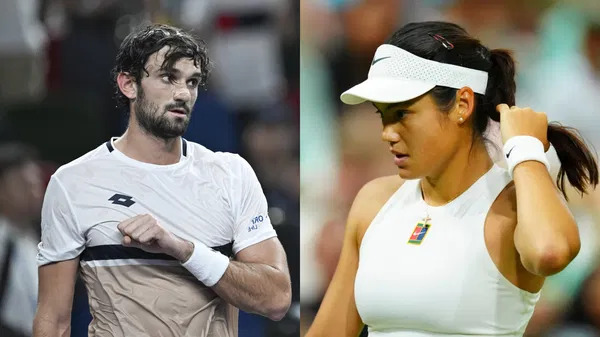
In professional tennis, where a single swing can change the course of history, few stories captivate audiences like an underdog’s extraordinary rise. The sport thrives on these unpredictable fairy tales—players defying odds, shocking top seeds, and etching their names into history. But when a retired player weighs in with a controversial opinion, the ensuing debate can ignite fierce loyalty among fans. That’s exactly what happened after former world No. 8 John Isner compared Emma Raducanu’s legendary 2021 US Open win to Valentin Vacherot’s unexpected triumph at the 2025 Shanghai Masters—a comment that sent Raducanu’s supporters into uproar.
To understand the outrage, one must revisit Raducanu’s stunning run in New York. At just 18 years old and ranked 150th in the world, she entered the 2021 US Open as a qualifier, a teenager with talent but little expectation. What followed was a spellbinding sequence of matches—ten straight victories, none requiring a deciding set. She dismantled top-tier opponents including Belinda Bencic and Maria Sakkari before overpowering fellow teen Leylah Fernandez in the final. In doing so, Raducanu became the first qualifier in Open Era history to win a Grand Slam. It wasn’t just a win—it was a perfect storm of poise, fearlessness, and destiny that turned a relative unknown into a global phenomenon overnight.
Fast-forward to October 2025, and the tennis world was abuzz again, this time thanks to Monaco’s Valentin Vacherot. Ranked outside the top 200, the 28-year-old came through qualifying at the Shanghai Masters and produced a staggering series of upsets. He defeated Holger Rune, Taylor Fritz, and even Novak Djokovic before taking down Alexander Zverev in the final to capture his first ATP Masters 1000 title. His journey, spanning nine matches, was nothing short of sensational and immediately drew comparisons to Raducanu’s 2021 breakthrough.
During an episode of The Nothing Major Show, hosted by Isner alongside Sam Querrey, Jack Sock, and Steve Johnson, the group debated which accomplishment was greater. Querrey posed the question: “Is this more impressive than Raducanu winning the US Open?” Isner didn’t hesitate. “I think it is more impressive, yes,” he replied. “Raducanu’s story is bigger because it’s the US Open, but this run is more improbable. I’m giving it to Vacherot—it’s just unheard of.”
That comment instantly set social media ablaze. Raducanu’s loyal fans were quick to accuse Isner of disrespecting one of the greatest modern tennis stories. “Ridiculous claim. The best players weren’t even there,” one user blasted, pointing to absences like Carlos Alcaraz and Jannik Sinner from the Shanghai draw. Another argued, “Emma was 18, had never won a WTA match, and didn’t drop a set in ten matches. You can’t compare that.” Others dismissed Isner outright: “What a horrible take. Who even asked him?” and “Leave Emma Raducanu alone.”
Many fans emphasized the unmatched difficulty of winning a Grand Slam as a qualifier—something that had never been done before or since. One post summed up the mood perfectly: “Vacherot’s win was great, but Raducanu’s US Open run is once-in-a-lifetime. She didn’t just win—she dominated.”
Still, some tried to defend Isner’s viewpoint, noting that Vacherot’s wins included victories over elite ATP players and that his performance should be respected in its own right. “You can only beat who’s in front of you,” one fan wrote, calling both stories “incredible examples of what makes tennis special.”
The debate comes at a delicate time for Raducanu, who is still working to rebuild her form after injury struggles. A recent quarterfinal appearance in Ningbo hinted at progress, and she’s looking to regain her footing ahead of the 2026 Australian Open. The renewed discussion around her 2021 triumph underscores how deeply her success remains embedded in tennis culture—four years later, her achievement continues to inspire and divide opinion.
For Vacherot, meanwhile, the Shanghai win has transformed his career trajectory, propelling him into the top 100 and giving him newfound recognition on the ATP Tour.
Ultimately, the controversy sparked by Isner’s remark reveals just how emotional and subjective the sport can be. Whether one sides with Raducanu’s flawless Grand Slam miracle or Vacherot’s improbable Masters heroics, both stories embody tennis at its best—unpredictable, passionate, and endlessly debatable. And as fans continue to argue over which run was greater, one truth remains clear: in tennis, the next unforgettable underdog tale is always waiting just around the corner.
Leave a Reply